被动语态unit9
八年级英语unit 9 when was he born 人教版(新目标)知识精讲
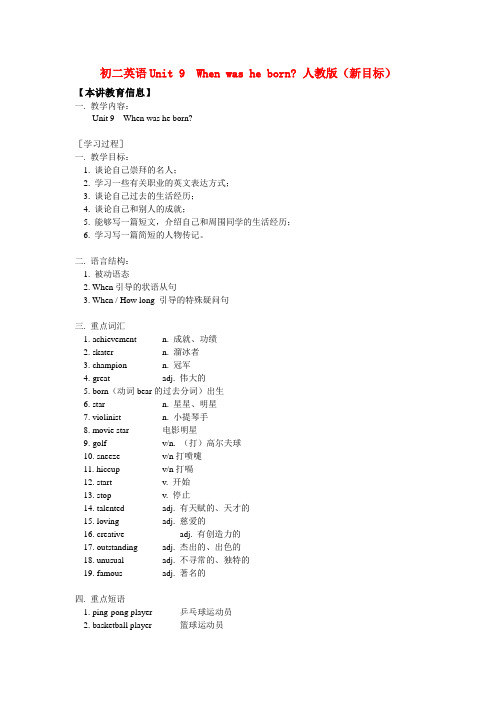
初二英语Unit 9 When was he born? 人教版(新目标)【本讲教育信息】一. 教学内容:Unit 9 When was he born?[学习过程]一. 教学目标:1. 谈论自己崇拜的名人;2. 学习一些有关职业的英文表达方式;3. 谈论自己过去的生活经历;4. 谈论自己和别人的成就;5. 能够写一篇短文,介绍自己和周围同学的生活经历;6. 学习写一篇简短的人物传记。
二. 语言结构:1. 被动语态2. When引导的状语从句3. When / How long 引导的特殊疑问句三. 重点词汇1. achievement n. 成就、功绩2. skater n. 溜冰者3. champion n. 冠军4. great adj. 伟大的5. born(动词bear的过去分词)出生6. star n. 星星、明星7. violinist n. 小提琴手8. movie star 电影明星9. golf v/n. (打)高尔夫球10. sneeze v/n打喷嚏11. hiccup v/n打嗝12. start v. 开始13. stop v. 停止14. talented adj. 有天赋的、天才的15. loving adj. 慈爱的16. creative adj. 有创造力的17. outstanding adj. 杰出的、出色的18. unusual adj. 不寻常的、独特的19. famous adj. 著名的四. 重点短语1. ping-pong player 乒乓球运动员2. basketball player 篮球运动员3. tennis player 网球手4. take part in 参加5. start doing / start to do 开始做…6. at the age of 在…岁时7. receive an honor 获得荣誉8. win the first prize 获得一等奖9. a piece of music 一段音乐10. a professional basketball player 一名职业篮球运动员五. 重点句子1. Who is that?那是谁?2. That’s Deng Yaping. She is a great ping-pong player.那是邓亚萍,她是一名伟大的乒乓球运动员。
Unit 9 When was he born-
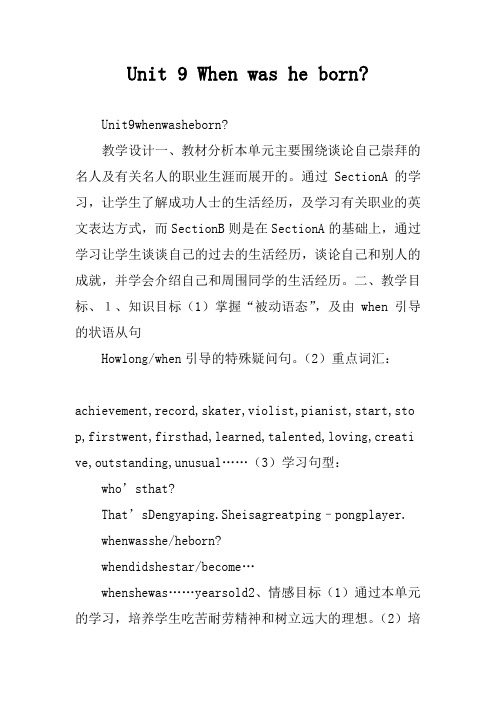
Unit 9 When was he born?Unit9whenwasheborn?教学设计一、教材分析本单元主要围绕谈论自己崇拜的名人及有关名人的职业生涯而展开的。
通过SectionA的学习,让学生了解成功人士的生活经历,及学习有关职业的英文表达方式,而SectionB则是在SectionA的基础上,通过学习让学生谈谈自己的过去的生活经历,谈论自己和别人的成就,并学会介绍自己和周围同学的生活经历。
二、教学目标、1、知识目标(1)掌握“被动语态”,及由when引导的状语从句Howlong/when引导的特殊疑问句。
(2)重点词汇:achievement,record,skater,violist,pianist,start,sto p,firstwent,firsthad,learned,talented,loving,creati ve,outstanding,unusual……(3)学习句型:who’sthat?That’sDengyaping.Sheisagreatping–pongplayer.whenwasshe/heborn?whendidshestar/become…whenshewas……yearsold2、情感目标(1)通过本单元的学习,培养学生吃苦耐劳精神和树立远大的理想。
(2)培养学生刻苦学习,并乐于参加社会实践的积极情感。
3、能力目标运用所学的知识进行人际交往,并做到学以致用。
三、本单元分为四课时,即:SectionA:1a—2c3a—4bSectionB:1a—2c,3b,3c3a,4,selfcheekPeriodone1.GreetingsandRevisionRevisethemonthsofayearandtheuseofordinalnumber.2.Pr ententationHello,everyone!Ihadapartyyesterday.whatk indofparty?canyouguess?Itwasmybirthdayparty.yes,Itw asmybirthdayparty.Iwasbornin…..whataboutyou?Let’sfindoutwhenwereyouwereborn.T:whenisyourbirthday?S: mybirthdayismarch5th.T:whenwereyouborn?S:Iwasbornin 1990.ThentalkaboutthebirthdayofwangXiaoya.Practicew henwereyouborn?andwhenwashe/sheborn?Payattentiontot hestructureSb+was/were+born+in+yearon+dateTalkaboutwangLiqin,thenpresentInternationals portsstars.3.workon1aTalkingaboutinternationalsport sstars4.workon1bListeningandwritingListentothetapeandwritetheyearwh enthesportsstarswereborn.Iwillplayittwice.Firsttime youcanonlylistenandthesecondtimeyoucanwrite.Tapescr iptconversation1Boy:who'sthat?Girl:That'sDengyaping .She'sagreatchineseping-pongplayer.Boy:whenwasshebo rn?Girl:Shewasbornin1973conversation2Girl:who'sthat ?Boy:That’smichaeljordan.He’sagreatAmericanbasketballplayer.Girl:whenwasheborn? Boy:Hewasbornin1963.conversation3Boy:who'sthat?Girl :That'smartinaHingis.She'sagreatSwisstennisplayer.B oy:whenwassheborn?Girl:Shewasbornin1980.conversatio n4Girl:who'sthat?Boy:That'sDavidBeckham.He'sagreatB ritishsoccerplayer.Girl:whenwasheborn?Boy:Hewasborn in1975.AnswersDengyaping:1973michaeljordan:1963mart inaHingis:1980DavidBeckham:1975Readthetapescriptand trytounderlinetheexpressionsandthewhen/howlongquest ions5.workon1cPairworkFirstlet’slookatthedialogueaboutDengyaping.Pleasereaditafter me.whenyoureadpleasepayattentiontothepronunciations andintonations.A:who’sthat?B:That’sDengyaping.Sheisagreatchineseping-pongplayer.A:whe nwassheborn?B:Shewasbornin1973.Nowmakethesimilardialogueaboutotherpeoplewithyourpartners.Thenactitout.6.workon2aListeningandfillingthechartLookatthepictu res.whataretheydoing?LearnthenewwordsHiccup 打嗝sneeze打喷嚏worldrecordmeansthebestintheworldLet’slistentothetapecarefullyandfillinthechart.whilelis tening,trytogettheimportantthing---“howlong”TapescriptGirl:who'sthat?Boy:charlesSmith.Heholdsth eworldrecordforhiccupping.Hehiccuppedfor69yearsand5 months.Girl:whendidhestarthiccupping?Boy:Hestartedh iccuppingin1922.Girl:Andwhendidhestop?Boy:Hestopped in1990.Girl:Howcouldhehiccupforthatlong?Boy:Idon'tk now.oh,look,thisisDonnaGreen.Girl:what'sshefamousfo r?Boy:Sneezing.Shesneezedfor978days.Girl:Really?whe ndidshestartsneezing?Boy:Let'ssee.Itsaysshestarteds neezingonjanuary13,1981,andshesneezeduntilSeptember16,1983.Girl:wow!That'salongtime.whoholdwo rldrecordHowlongStartedStoppedcharleshiccupping69ye arsand5monthsDannaGreensneezing978days7.workon2bLis teningandfillinginthechart.Listenagainandfillinthe“started”and“stopped”columns.whoholdsworldrecordHowlongStartedStoppedcha rleshiccupping69yearsand5months19221990DannaGreensn eezing978daysjanuary13,98119838.workon2cFillingthechartandspeakingFirstlet’sfillintheblankwiththeinformationfromthechartinlast part.A:HowlongdidcharlesSmithhiccup?B:Hehiccuppedfo r69yearsand5months.A:whendidhestarthiccupping?B:Hestartedin1922 A:whendidhestophiccupping?B:Hestoppedin1990.Pleasepracticetheconversationwithyo urpartner.makethesamekindofconversationaboutDonnaGr een.Thestudents’conversationmaybelikethis.A:HowlongdidDonnaGreensne ezing?B:Shesneezingfor978days.A:whendidshestarthers neezing?B:Shestartedonjanuary13,1981.A:whendidshest opsneezing?B:ShestoppedonSeptember16,1983.9.writing writeapassageaboutcharlesandDonna.GrammarFocuswhenw ereyouborn?→Iwasbornin1981.whenwasheborn?→Hewasbornin1992.whenwassheborn?→Shewasbornin1895.youplaybasketball?→Iplayedbasketballfortwoyears.Howlongdidheplaychess?→Heplayedchessfor213days.shehiccup?→Shehiccuppedforoneyearandtwomonths.whendidhestarthi ccupping?→Hestartedhiccuppingin1922.whendidhestophiccupping?→Hestoppedhiccuppingin1990.HomeworkRecite1c,2c.write downyoufavoritestarsorplayersaboutwhentheywereborna ndhowlongdidtheystarttheirwork.Periodtwo1.Greetings 2.AchantGood,better,bestNeverletitrestTillgoodisbet terAndbetterisbest3.RevisionDoingpairwork4.workon3aFirstyoureadandfillinthechar twithyourpartner.Thewordachievementmeans “theimportantthingeachpersondidinlife.AchievementAgeTigerwoodsStartedgolf10monthsoldShirleyTemplemovi estarThreeyearoldwolfgangAmadeusmozartwritingmusicF ouryearsoldmeiLanfangFirstperformedBeijingoperaTenR onaldoPlayedforhisnationalteamSeventeenLiuxuanwonag oldmedalattheworldchampionshipseventeen5.workon3bDo ingpairworkSinceyouhavefinishedreadingthechartandfi llinginyouranswers,pleaseworkinpairsastheexamplesin thebook.A:whoisShirleyTemple?B:Sheisamoviestar.A:whendidshebecomeamoviestar?B:whenshewasthreeyears old.6.workon4aInterviewingBoysandgirls,let’splayagame,aninterview.Lookatthechartandinterviewyo upartnersbyaskingthequestion.Howoldwereyouwhen…?Na meAchievementAgemoreinformationLearnedtorideabicycl eStartedlearningEnglishStartedplayingsportsFirstwen ttoamovieFirsthadaparty7.workon4bwhowouldliketotell ushisreportabouthisinterview?johnstartedthingsearly .Helearnedtorideabicyclewhenhewasonlythree.Sometime shefelloffthebike,buthenevergaveup.Hewasabraveboy.8 .Playaguessinggame.whoishe/she?9.DiscussionArewetooyoungtostartdoingthings?10.Homework:1.ReciteActivity3a2.makeacardandwr iteareport.Period31.warmingupbydescribingapersonIkn owyouhavelotsofgoodfriendsinyourclass.canyoudescrib ethemandletyourpartnersguesswhotheyare.Forexample:m yfriendisaboy.Heistwelveyearsold.Helivesnearthescho ol.Hecomestoschoolonfoot.Hehasaroundfacewithshortha ir.HelikesplayingPing-Pong…canyouguess?2:Practice A:Howoldwereyouwhenyoustarteddoing……B:Istarteddoing……whenIwas……yearsold.3.workon1aLookingatthesepeopleanddescribin gwiththewordsDoyouknowwhatarethemeaningsofthewords? talentedlovingoutstandingunusualbeautifulcreativeki ndfamousTalentedmeans“verycleverinaspecialway”.outstandingmeans “verygood,muchbetterthanothers”.creativemeans “havingtheabilityorpowertocreate,productive.”4.workon1bSpeakingImagineyouknowthepeopleinthepictu resabove.TellyourgroupaboutthepeopleTonyisanoutstan dingpianist.Heiscreativeandlovesmusicverymuch.Hespe ndsallhisfreetimeonit.5.Playaguessinggame.Theboywas bornonjuly13,1983.Heisafamoussportsplayer.Heisgooda trunninginthehurdle--races.Heholdstheworldrecordforthemen’s110mhurdles.Hestartedhurdlingin1999.Hehurdledfor8y ears.whoishe?6.workon2aListeningandcirclingthewords Listen,twopeoplearetalkingaboutpeopletheyadmire.cir clethewordsyouhear.talentedlovingoutstandingunusual beautifulcreativekindfamousTapescriptBoy:whodoyouad mire?Girl:Iadmiremidori.Boy:midori?who'sthat?Girl:S he'safamousviolinist.Boy:oh,yeah.She'sjapanese,isn' tshe?Girl:yes,shewasborninosakain1971.whenshewaseig ht,shewasalreadyatalentedviolinist.whenshewasfourte en,shetouredtheUnitedStates.IsawherplaywhenIwaseight.Boy:wow.DoyouhaveanyofhercDs?Girl:yes,Ido .Iplaythemallthetime.Buthowaboutyou?whodoyouadmire? Boy:Iadmiremygrandmother,Laura.Girl:Really?why?Boy: well,shewasborninRussiain1932.Shewasanunusualgirlbe causeshestartediceskatingwhenshewasfour,andshebecam easkatingchampionwhenshewasten.Girl:Askatingchampio n?Didshehavetoworkhard?Boy:yes,veryhard.Butthatwasa longtimeago.Nowshe'sakindandlovinggrandmother.Nowle t’schecktheanswerstalentedlovingoutstandingunusualbea utifulcreativekindfamous7.workon2bListeningandwriti ng“m”or“L”onthelines.1.mSheisafamousviolinist.2.mShewasbornin 1971.3.LShestartediceskatingwhenshewasfour.4.mIsawh erplaywhenIwaseight.5.LShe’sakindandlovinggrandmother.6.LShewasbornin1932.7.LS hebecameaskatingchampionwhenshewasfourteen.8.mSheto uredtheU.S.whenshewasfourteen.Readthetapescriptinor dertounderlinetheexpressionsandshadowtheconnectives .copytheexpressionsintoyourExpressionBookafterschoo l.8.InterviewSupposemidoriandLauraarevisitingourcit ingthelisteninginformationtomakeaninterview.9.w orkon2cAskandanswerquestionsaboutmidori.A:who’smidori?B:She’safamousviolinist.A:whenwassheborn?B:Shewasbornin19 71.A:whendidshetourtheU.S.?B:whenshewasfourteen,she touredtheUnitedStates.AskandanswerquestionsaboutLau ra.A:who’sLaura?B:She’saskatingchampion.A:whenwassheborn?B:ShewasborninRu ssiain1932.A:whendidshebecomeaskatingchampion?B:She becameaskatingchampionwhenshewasten.youshouldpracticethesedialoguesasmuchaspossible.10.workon3bwriting urawasbor nin1932.Shestartediceskatingwhenshewasfourandbecame askatingchampionwhenshewasten.Sheworkedveryhard.Nows he’sakindandlovinggrandmother.2.Name:yaomingBorn:1980989:startedplayingbasketball1997:joinedchinaNationa lTeamXX:cametotheU.S.PlayedforNBA11.Homework1.Revise2.Se archtheInternetorreadsomebooksfortheinformationofth epersonsyouadmire.Andtelluswhyheorheissuccessful.Period41.Greeti ngsandrevision.Sssaytheirownpastlife:Howoldwereyouw henyoustarteddoing……?2.workon3aReadingandfillingthechart.Liyundi,thewell -knownchinesepianist,alwayslovedmusic.Hewasbornin1982inchongqing.whenhewasasmallboy,hecouldhumsongsa nddifficultpiecesofmusic.Hebegantolearntheaccordionattheageoffour,andh estartedtolearnthepianowhenhewasseven.InoctoberXX,Liyunditookpartinthe14th chopinInternationalPianocompetitioninPoland.Hewonthefirstprizeinhisgro up.Hewasalsothefirstchinesepianistinthe70-yearhisto ryofthecompetitiontowinthisprize.whenwhat1982wasbor nwhenhewasasmallboycouldhumsongsanddifficultpieceso fmusicAttheageoffourBegantolearntheaccordionwhenhew assevenStartedtolearnthepianoInoctober,XX.Tookparti nthe14thchopinInternationalPianocompetition3.Retell thestory4.whatdidwelearnfromLiyundi?Geniusisnothing butlaboranddiligence.天才不过是勤奋而已。
温州蒙氏英语九年级unit9 被动语态练习
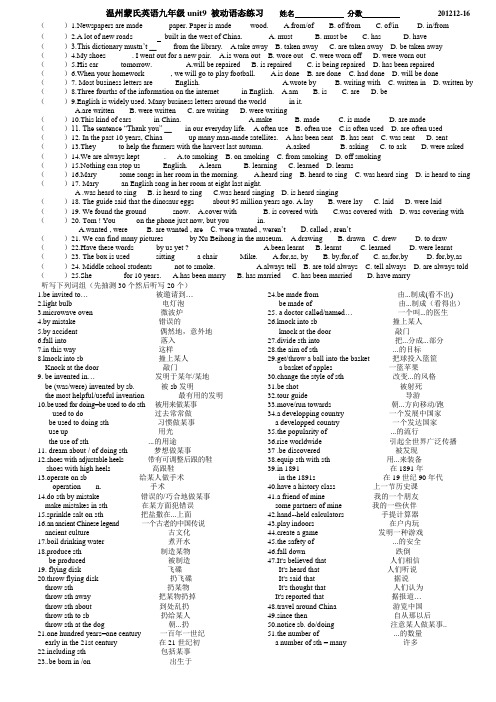
温州蒙氏英语九年级unit9 被动语态练习姓名分数201212-16 ()1.Newspapers are made ______ paper. Paper is made ____ wood. A.from/of B. of/from C. of/in D. in/from()2.A lot of new roads ______ built in the west of China. A. must B. must be C. has D. have()3.This dictionary mustn’t ______ from the library. A.take away B. taken away C. are taken away D. be taken away()4.My shoes ______ . I went out for a new pair. A.is worn out B. wore out C. were worn off D. were worn out()5.His car _____ tomorrow. A.will be repaired B. is repaired C. is being repaired D. has been repaired()6.When your homework ______ , we will go to play football. A.is done B. are done C. had done D. will be done()7. Most business letters are _____ English. A.wrote by B. writing with C. written in D. written by ()8.Three fourths of the information on the internet _____ in English. A.am B. is C. are D. be()9.English is widely used. Many business letters around the world _____ in it.A.are writtenB. were writtenC. are writingD. were writing()10.This kind of cars _____ in China. A.make B. made C. is made D. are made()11. The sentence “Thank you” _____ in our everyday life. A.often use B. often use C.is often used D. are often used()12. In the past 10 years, China ______ up many man-made satellites. A.has been sent B. has sent C. was sent D. sent()13.They _____ to help the farmers with the harvest last autumn. A.asked B. asking C. to ask D. were asked ()14.We are always kept ______. A.to smoking B. on smoking C. from smoking D. off smoking()15.Nothing can stop us _____ English. A.learn B. learning C. learned D. learns()16.Mary _____ some songs in her room in the morning. A.heard sing B. heard to sing C. was heard sing D. is heard to sing ()17. Mary _____ an English song in her room at eight last night.A .was heard to sing B. is heard to sing C.was heard singing D. is heard singing()18. The guide said that the dinosaur eggs ____ about 95 million years ago. y B. were lay C. laid D. were laid()19. We found the ground ______ snow. A.cover with B. is covered with C.was covered with D. was covering with ()20. Tom ! You _____on the phone just now, but you _______in.A.wanted , wereB. are wan ted , areC. were wanted , weren’tD. called , aren’t()21. We can find many pictures ______ by Xu Beihong in the museum. A.drawing B. drawn C. drew D. to draw()22.Have these words _____ by us yet ? A.been learnt B. learnt C. learned D. were learnt()23. The box is used ______ sitting _____ a chair _____ Mike. A.for,as, by B. by,for,of C. as,for,by D. for,by,as ()24. Middle school students _____ not to smoke. A.always tell B. are told always C. tell always D. are always told ()25.She________ for 10 years. A.has been marry B. has married C. has been married D. have marry听写下列词组(先抽测30个然后听写20个)1.be invited to…被邀请到…2.light bulb 电灯泡3.microwave oven 微波炉4.by mistake 错误的5.by accident 偶然地,意外地6.fall into 落入7.in this way 这样8.knock into sb 撞上某人Knock at the door 敲门9. be invented in…发明于某年/某地be (was/were) invented by sb. 被sb发明the most helpful/useful invention 最有用的发明10.be used for doing=be used to do sth 被用来做某事used to do 过去常常做be used to doing sth 习惯做某事use up 用光the use of sth ...的用途11. dream about / of doing sth 梦想做某事12.shoes with adjustable heels 带有可调整后跟的鞋shoes with high heels 高跟鞋13.operate on sb 给某人做手术operation n. 手术14.do sth by mistake 错误的/巧合地做某事make mistakes in sth 在某方面犯错误15.sprinkle salt on sth 把盐撒在...上面16.an ancient Chinese legend 一个古老的中国传说ancient culture 古文化17.boil drinking water 煮开水18.produce sth 制造某物be produced 被制造19. flying disk 飞碟20.throw flying disk 扔飞碟throw sth 扔某物throw sth away 把某物扔掉throw sth about 到处乱扔throw sth to sb 扔给某人throw sth at the dog 朝...扔21.one hundred years=one century 一百年一世纪early in the 21st century 在21世纪初22.including sth 包括某事23..be born in /on 出生于24.be made from 由...制成(看不出)be made of 由...制成(看得出)25. a doctor called/named… 一个叫...的医生26.knock into sb 撞上某人knock at the door 敲门27.divide sth into 把...分成...部分28.the aim of sth ...的目标29.get/throw a ball into the basket 把球投入篮筐a basket of apples 一篮苹果30.change the style of sth 改变...的风格31.be shot 被射死32.tour guide 导游33.move/run towards 朝...方向移动/跑34.a developping country 一个发展中国家a developped country 一个发达国家35.the popularity of ...的流行36.rise worldwide 引起全世界广泛传播37 .be discovered 被发现38.equip sth with sth 用...来装备39.in 1891 在1891年in the 1891s 在19世纪90年代40.have a history class 上一节历史课41.a friend of mine 我的一个朋友some partners of mine 我的一些伙伴42.hand--held calculators 手提计算器43.play indoors 在户内玩44.create a game 发明一种游戏45.the safety of ...的安全46.fall down 跌倒47.It's believed that 人们相信It's heard that 人们听说It's said that 据说It's thought that 人们认为It's reported that 据报道…48.travel around China 游览中国49.since then 自从那以后50.notice sb. do/doing 注意某人做某事..51.the number of ...的数量a number of sth = many 许多1-5 BBDDA 6-10 ACBAC 11-15 CBDCB 16-20 DCDCC 21-25 BAADC。
Unit9被动语态的翻译Thepassivevoice

Points
1. • • • • 2. 3. English to Chinese: Into active voice附 Remaining unchanged附 Into subjectless sentence附 Into other forms附 Chinese to English附 Exercises附
Unit 9 The passive voice
• The passive voice is usually used in English, esp. in the scientific articles; however, in Chinese we seldom use it because it often makes us feel unpleasant with the words “被、遭、受、挨”etc. • Therefore, we like to change the passive voice to other forms in Englisunchanged 英语被动—汉语被动(主语不变)
1. At the end of the month he was fired for incompetence. 月底,他因无法胜任工作而被解雇了。 2. He was attacked by two masked men. 他遭到两个蒙面男子的袭击。 3. She was loudly applauded. 她大受欢迎 4. Most of China’s elderly are provided for by their families. 中国大多数老年人由家庭赡养。
Into the active voice 英语被动--汉语主动(主语不变)
1. The whole country was armed in a few days. 几天之内全国就武装起来了。 2. By the end of the war 800 people had been saved by the organization. 战争结束之前,这个组织已经拯救了800人。 3. The picture was painted by Professor Smith. 这幅画是史密斯教授画的。 4. It is well known that smoking is harmful to health. 5. A good archer is not known by his arrows, but his aim. 好弓手的美名并不是来自他的弓箭,而来自他的瞄准功夫。
九年级英语Unit9 知识点
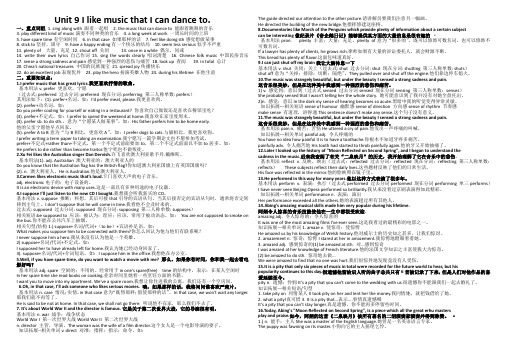
Unit 9 I like music that I can dance to.一、重点词组1. sing along with 跟着一起唱 2. the music that can dance to 能跟着跳舞的音乐3. play different kind of music演奏不同种类的音乐4. a long week at work 一周长时间的上班5. have spare time有空闲时间6. in that case 如果那样的话7. feel like doing sth感觉想做某事8. stick to坚持,固守9. have a happy ending有一个快乐的结局10. seem less serious似乎不严重11. plenty of 大量,充足12. shout off 关闭13. once in a while 偶尔,间或14. write their own lyrics 自己作词15. sing the words clearly 唱词清楚16. Chinese folk music 中国民俗音乐17. sense a strong sadness and pain感觉到一种强烈的悲伤与痛苦18. look up 查阅19. in total 总计20. China’s national treasures 中国的民族瑰宝21. spread joy传播快乐22. do an excellent job表现优异23. play the hero扮演英雄人物24. during his lifetime 在他生前二。
重要知识点:1.I prefer music that has great lyrics.我更喜欢抒情的歌曲。
基本用法v. prefer 更喜欢,宁愿(过去式: preferred 过去分词: preferred 现在分词: preferring 第三人称单数: prefers)其用法如下:(1). prefer+名词。
教科版九年级英语上册:Unit 9 Help Yourself by Helping Others
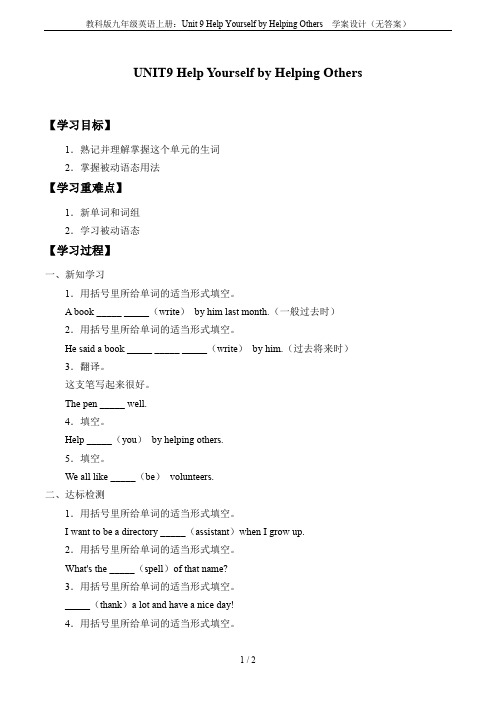
UNIT9 Help Yourself by Helping Others【学习目标】1.熟记并理解掌握这个单元的生词2.掌握被动语态用法【学习重难点】1.新单词和词组2.学习被动语态【学习过程】一、新知学习1.用括号里所给单词的适当形式填空。
A book _____ _____(write)by him last month.(一般过去时)2.用括号里所给单词的适当形式填空。
He said a book _____ _____ _____(write)by him.(过去将来时)3.翻译。
这支笔写起来很好。
The pen _____ well.4.填空。
Help _____(you)by helping others.5.填空。
We all like _____(be)volunteers.二、达标检测1.用括号里所给单词的适当形式填空。
I want to be a directory _____(assistant)when I grow up.2.用括号里所给单词的适当形式填空。
What's the _____(spell)of that name?3.用括号里所给单词的适当形式填空。
_____(thank)a lot and have a nice day!4.用括号里所给单词的适当形式填空。
What is this story _____(most)about?5.用括号里所给单词的适当形式填空。
It is nice to know that by helping _____(other),you can help yourself, too.。
新目标九年级英语U9_When_was_it_invented
Unit 9 When was it invented?(Section A)一.语法:被动语态1.被动语态的时态: 被动语态的时态通过be的变化来体现,它必须与主语的人称、数一致。
以下是几种常用的被动语态:(1)一般现在时的被动语态: am / is / are + 动词的过去分词。
Eg:This book in two languages.这本书是用两种语言写的.(2)现在进行时的被动语态: am / is /are + being + 动词的过去分词。
Eg: A school is by the workers now.工人们正在建一所学校.(3) 一般将来时的被动语态: will / be going to + be + 动词的过去分词.Eg: The project will next month.这项工程下个月就完工.(4) 现在完成时的被动语态: have / has + been + 动词的过去分词.Eg: My homework .我的作业以完成了.(5) 一般过去时的被动语态: was / were + 动词的过去分词.Eg: The classroom three days ago. 教室是三天前被打扫的.(6) 含有情态动词的被动语态: 情态动词+be +动词的过去分词.The classroom every day.教室应该每天都被打扫.2.被动语态的否定句和疑问句:(1)否定句的构成:必须在第一个助动词后加not。
Eg:His homework finished. 他的作业还没有完成。
(2)疑问句的构成:将第一个助动词置于主语之前。
Eg:When the bridge ?这座桥是何时建的?3、主动语态变被动语态的方法:(1)把主动语态变的宾语作为被动语态的主语(2)主动语态的谓语改成be + 过去分词的形式,作为被动语态的谓语,be随着主语以及时态的变化而变化。
(3)主动语态的主语变为by的宾语,有时可以省略。
unit9-when-was-it-invented说课稿市公开课一等奖课件名师大赛获奖课件
b
e
a
d c
1876 1885 1927
1971
1976
A: When was the __c_ar____ invented?
B: I think it was invented in _1_88_5___.
A: What is the _______ used for?
B: It is used for(用来做……) t_a_lk_i_ng__w_it_h__p_e.ople
Unit 9 When was it invented?
Sectinon A (1a-Grammar Focus)
The passive voice 被动语态 在被动语态的句子中, 谓语部分的构
造是be + 过去分词。被动语态的句子 的时is / are + 过去分词 普通过去时 was / were + 过去分词 含有情态动词的被动语态:
3
1
2
Listening (2b: P69)
A:Who was it / were they invented by ?
B:It was/ They were invented by
Jayce Coziar and Jamie Ellsworth
杰斯 .克里亚 Julie Thompson 朱莉.汤普森 Chelsea Lanmon 切尔西.莱蒙
• They are used for changing the style of the shoes.
A: Look! This looks so interesting!
B: Ah, it’s a great invention of China.
A: Really? When _w__a_s__ it _in_v_e__n_t_e_d_? B: I think it __w_a_s_ _in__v_e_n_t_e_d_ in Han Dynasty.(汉朝) A: What ___is___ it _u_s_e__d_ for?
人教版初三(上)英语第18讲:Unit 9语法(学生篇)
人教版初三(上)英语第18讲:Unit 9语法(学生篇)Unit 9 语法篇____________________________________________ __________________________________________________________________________________ ______________________________________被动语态和定语从句1. 被动语态(1). 被动语态表示句子的主语是谓语动词所表示的动作承受者。
(2). 被动语态基本结构:be+及物动词的过去分词(如果是不用物动词,其过去分词应带有相应的介词)(3). 被动语态中的be 是助动词,有人称、数和时态的变化。
一般现在时被动语态为:am/is/are+过去分词一般过去时被动语态为:was/were+ 过去分词与情态动词连用的被动语态:情态动词+ be + 过去分词(4). 被动语态中动作的发出者或执行者做介词by的--I think a bridge(桥)______over the river.A. should be builtB.is being builtC. has been builtD. was built2. After Mandela was free (自由的) in 1990, he chose to shake hands with the people ________ wanted to kill him.A. whoseB. whichC. /D. who3.The movie ______ we saw last night was fantastic.A. thatB. whatC. whoseD. Who4.—Where is the School English Speech Contest going to be held tonight?—I’m not sure. Is it in the hall _____ can hold 300 people?A.whereB. whatC. thatD. whe n5. Some old people like to live in a flat________ isnot very high.A. thatB. whoC. whatD. whose基础演练I.用适当的关系词填空(that、who、which、whom)1. Alice likes singers _________ write their own music.2. Generally, old people like music _______ is quiet and gentle.3. The girl ____________often helps me with my English is from England.4. This is the school in _______ I studied two years ago.5.The man _______ is talking with my father over there is our head teacher.II.按照要求写句子。
Unit 9 When was it invented知识点归纳
Unit 9 When was it invented ?【知识点整理】1. 被动语态(1)被动语态表示句子的主语是谓语动词所表示的动作承受者。
(2)被动语态基本结构:be+及物动词的过去分词(如果是不及物动词,其过去分词应带有相应的介词)(3)被动语态中的be 是助动词,有人称、数和时态的变化。
一般现在时的被动语态为:am/is/are+过去分词一般过去时的被动语态为:was/were+ 过去分词与情态动词连用的被动语态:情态动词+ be + 过去分词(关于被动语态,大家一定要熟悉,这个在中考的时候属于是必考内容,而且是重点内容)(4)被动语态中动作的发出者或执行者做介词by的宾语,放在句末,by 表示“由,被”的意思,如何理解被动语态?为了更清晰、更深刻地理解被动语态的含义,可以将主动语态和被动语态的句子结构进行比较。
主动语态:主语+谓语动词+宾语+其他成分被动语态:主语+be+过去分词+by+宾语+其他成分如:Many people speak English.被动语态:English is spoken by many people.3. invent v. 发明 inventor n. 发明家invention n. 发明,可数名词4. be used for doing ,用来做…(是被动语态)(这个短语的考点有两点,一是used for的意思,二是for后面用动名词)Pens are used for writing. 笔是用来写的。
5. 给某人某样东西give sth. to sb. I gave a pen to him. 我给他一支笔。
give sb. sth. I gave him a pen. 我给他一支笔。
6. all day 整天7. salty adj. 咸的 salt n. 盐8. by mistake 错误地(犯错是:make mistake,这些常见的短语大家务必要掌握)I took the umbrella by mistake. 我不小心拿错了雨伞。
- 1、下载文档前请自行甄别文档内容的完整性,平台不提供额外的编辑、内容补充、找答案等附加服务。
- 2、"仅部分预览"的文档,不可在线预览部分如存在完整性等问题,可反馈申请退款(可完整预览的文档不适用该条件!)。
- 3、如文档侵犯您的权益,请联系客服反馈,我们会尽快为您处理(人工客服工作时间:9:00-18:30)。
据推测说… … It is supposed that …
不用被动语态的情况 (考点)
1)不及物动词不用被动语态;注意:happen, break out ,take place The story was happened in 1934. ( × ) 2)表状态的动词不用被动语态;have, lack, fit…
14.The students study German in this school. is studied German _______ ________ by the students in this school. 15.Do they often talk about this question?
Hale Waihona Puke Gina can be taken good care of by Amy.
情态动词:
S+ can/may/must/should + be+过去分词
4)情态动词:The rubbish can be put into the dustbin over there.
4.They will finish the work in ten days.
10.The teacher asked Tom to turn on the computer.
was asked Tom _______ ________ to turn on the computer.
11.In this factory women do most of the work.
Most of the work _______ ________ is done by women in this factory.
12.He can mend the bike in two days. can be mended The bike ______ ______ _______ in two days. 13.You must take this medicine three times a day. must _______ be This medicine _______ taken ________ three times a day.
watch---watched study---studied
practice---practiced stop---stopped
done do write written go gone
2.不规则动词的过去分词: am have been is had has are
改为被动语态
He
主
plants
时态
主动语态
被动语态
am/is/are +Vpp was/were +Vpp
一般现在 V(原形)/ V(e)s 时 一般过去 V-ed/ made 时
一般将来 will +V(原形) will+ be +Vpp 时 含情态动 情态动词+ 词 V(原形) 情态动词+ be +Vpp
各种时态的被动语态构成
His brother washes bowls every 宾(受动者) day. 主 谓
Bowls are washed byhis brother every day.
1.They make shoes in that factory.
主语+及物动词+宾语 Shoes are made factory. 一般现在时: (by them) in that
3) English is spoken (speak) in China. ____
is made 4) The car ____ (make) in China.
5) The room must be cleaned(clean) _____ every day.
talked Is ______ this question often _______ about _______them by _______?
be allowed (allow) 1)Teenagers should _____ to go out at night.
was invented(invent) 2)The telephone _____ by Bell.
特殊情况 (考试重点 )
1)感官动词 ( taste ; feel ; smell ; sound ; look ) 用主动形 式表示被动。 How sweet the music sounds ! Good medicine tastes bitter to the mouth . 2) write、read、sell、keep、prove、weigh、number、 drink、wear、pay、wash、open常用主动形式表被动意义。 尤其是有副词 well, easily时。 The book sells well . ( 这本书销路很好。 ) The door will not open . ( 这扇门就是打不开。 ) This dress washes better . ( 这衣服较好洗。 ) The sign reads as follows . ( 这牌子告示如下。 )
3)need, demand, want(需要), require, be worth等后用动 名词表被动。 The desk needs repairing. The novel is worth seeing. 注意:need后可接动名词表被动,又可接动词不定式的被动形 式。但若有附加成分有用动词不定式的被动形式。比较: The desk needs repairing. The desk needs to be repaired. 4) 注意动名词的被动形式,(being done) Nobody likes being laughed of. 没人喜欢被嘲笑。
(变被动语态)
1.People use knives for cutting things.
are used Knives ______ ______ for cutting things. 2.The students clean the windows of their classroom twice a month.
4.I told her to return the book in time.
was told She ______ _______ to return the book in time.
5. His doctor made him have only two meals a day. was made to have He ______ _______ _______ _______ only two meals a day. 6.Now people can use computers to help them. can be Now computers _______ ______ ______ to help them. used
过去进行时: S+ was/were+being+ P.P.
二、汉语中含有“据说”、“据悉”、“有 人说”、“大家说”等时。例如:
It is said that one day he climbed to the top of a house and ……
It was reported that her mother died of SARS. 众所周知… … It is well known that …
7. Did you plant many trees at this time last year? Were ______ _______ _______ many trees planted _______
at this time last time?
8.Must we finish our work today?
Passive voice
被动语态基本用法
当句子的主语是动作的执行者时, 谓语的形式是主动语态。当句子的 主语是动作的承受者时,谓语要用 被动语态。被动语态由助动词be+ 过去分词构成,时态通过be表现出 来。
1.规则动词的过去分词:
1)一般情况在动词原形后加-ed
2)以不发音e结尾的加-d 3)以辅音加y结尾的,去y变i加-ed 4)以重读闭音节结尾,末尾只有一个辅音字母, 先双写该辅音字母,再加-ed
S(主语)+am/is /are +过去分词
2. They term.
bought
ten computers last
Ten computers were bought (by them) last term. 一般过去时:S+was/were +过去分词
3.Amy can take good care of Gina .
Must be finished _______ our work______ _______ today?
9. The foreign friends gave us some wonderful stamps. we were given 1) _______ ______ _______ some wonderful stamps. 2) Some wonderful stamps _______ were ________ _______ _______. given to us
I have a new bike.
3)连系动词不用被动语态; The story is sounded true. ( × ) 4)有些短语不用被动语态 do one’s best, make a face, make room(腾位子), make up one’s mind, belong to
